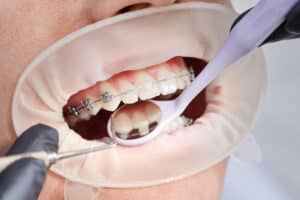Pain-Free Progress: How to Manage Braces Discomfort Effectively
Getting braces is a big step in improving your smile and overall dental health. However, as many people know, there’s a period of discomfort that comes with it. From tight wires to sore gums, the process can feel a bit challenging at times. But managing braces discomfort doesn’t have to be overwhelming. With the right strategies, you can reduce the pain and make your journey to a better smile much more manageable. Explore how to manage braces discomfort effectively so you can feel more at ease throughout your treatment.
Understanding Braces Discomfort
When you first get braces, it’s common to experience some discomfort. This is mostly due to the pressure applied to your teeth as they begin to move into new positions. It’s important to understand what causes this discomfort, as it can help you better manage it.
What causes discomfort?

- Braces tightening: Every time your orthodontist adjusts your braces, you may feel pressure on your teeth. This is a normal part of the process as your teeth shift.
- Brackets and wires: The metal parts of your braces can rub against the inside of your lips and cheeks, causing irritation and soreness.
- Shifting teeth: As your teeth start to move, they put pressure on the bones around them. This can cause soreness, especially after adjustments.
How long will discomfort last?
- Initial discomfort: Most people feel some pain or sensitivity in the first few days after getting their braces. This is usually short-lived and starts to subside within a week.
- After adjustments: When your orthodontist tightens your braces, you may experience discomfort again. This typically lasts for a few days and gradually improves.
- Throughout treatment: As your teeth continue to shift, minor discomfort may occur periodically. However, this should lessen as you adjust to wearing the braces.
Understanding these causes will help you feel more in control and make it easier to implement ways to manage braces discomfort.
How to Manage Braces Discomfort: Immediate Solutions
When braces discomfort strikes, it’s helpful to have a few immediate solutions on hand to relieve the pain. These methods can offer quick relief and make the adjustment period more manageable.
Use Orthodontic Wax
One of the simplest and most effective ways to soothe irritation is by using orthodontic wax. This wax can be applied directly to the brackets and wires that are causing discomfort in your mouth. It acts as a cushion, preventing the metal from rubbing against the inside of your cheeks or lips.
- How to apply: Take a small piece of wax and roll it into a ball. Flatten it slightly and place it over the offending bracket or wire.
- Where to apply: Focus on the areas that are directly causing irritation. This will help reduce the soreness and provide immediate relief.
Pain Relief Options
Pain relievers can be a great option when the discomfort becomes too much to bear. Over-the-counter medications like ibuprofen or acetaminophen are effective at reducing pain and inflammation. Be sure to follow the recommended dosage for your age and weight.
- Pain relievers: Taking these medications can help ease the discomfort and allow you to go about your day without being distracted by the pain.
- Saltwater rinse: Gargling with warm saltwater can also help to reduce inflammation and soothe sore spots. Mix a teaspoon of salt in a glass of warm water and swish it around in your mouth for 30 seconds.
Cold Compresses
Applying a cold compress to the outside of your face can help reduce swelling and numb the pain. This is especially useful in the first few days after getting braces or following adjustments.
- How to use: Wrap an ice pack or a bag of frozen peas in a cloth and hold it against your cheek for 15 to 20 minutes. The cold will help reduce inflammation and provide temporary relief from the soreness.
These immediate solutions can help you manage braces discomfort in the short term, making it easier to adjust to your new braces and continue with your treatment comfortably.
Long-Term Strategies to Manage Braces Discomfort
While immediate solutions can offer temporary relief, long-term strategies are key to managing braces discomfort throughout the entire treatment process. Adopting these habits will not only make the journey more comfortable but also contribute to the overall success of your orthodontic treatment.
Maintaining Good Oral Hygiene
Keeping your mouth clean is crucial for preventing further discomfort and potential complications. Braces can trap food particles and plaque, which may lead to irritation or even infections. Regular brushing and flossing will help maintain healthy gums and teeth.
- Brushing: Use a soft-bristled toothbrush and fluoride toothpaste to gently clean your teeth and braces after every meal. Be sure to brush around the brackets and under the wires to remove any debris.
- Flossing: Flossing can be tricky with braces, but it’s essential to remove food stuck between your teeth. Consider using floss threaders or specialized orthodontic flossers to make this process easier.
Eating Soft Foods
For the first few days after getting braces or following an adjustment, eating soft foods can make a big difference in reducing discomfort. Chewing tough or hard foods can put unnecessary pressure on your teeth and aggravate pain.
- Recommended soft foods: Opt for foods like mashed potatoes, yogurt, smoothies, scrambled eggs, and soft fruits like bananas. These are easy to chew and won’t irritate your braces or gums.
- Avoiding hard or sticky foods: Foods such as hard candy, nuts, and caramel can get stuck in your braces or damage the wires. Sticking to softer options during the initial days after adjustments can help keep discomfort at bay.
Staying Hydrated
Hydration is crucial in more ways than one. Drinking enough water helps keep your mouth moist, reducing irritation from dry mouth, which is common with braces. Staying hydrated also supports your overall health and can aid in the healing process, making it easier to manage braces discomfort effectively.
- Hydration tips: Aim to drink water throughout the day, especially after meals, to wash away food particles and keep your mouth comfortable.
Avoiding Hard or Sticky Foods
Certain foods can make braces discomfort worse by either causing additional pressure on your teeth or getting stuck in your braces. For instance, sticky foods like caramel and gum can pull on your brackets, while crunchy foods like popcorn and raw carrots can put too much force on your teeth.
- Food to avoid: Hard candies, popcorn, chewy caramel, and tough meats. These foods can cause pain, dislodge brackets, or break wires, all of which lead to increased discomfort.
By implementing these long-term strategies, you’ll be able to manage braces discomfort more effectively and maintain your progress toward a straighter, healthier smile.
When to Contact Your Orthodontist
While most discomfort is temporary and manageable at home, there are times when it’s important to reach out to your orthodontist. If you experience any of the following issues related to managing braces discomfort, it’s best to consult with a professional to ensure everything is progressing smoothly.
Excessive or Persistent Pain

It’s normal to experience some discomfort after getting braces or after an adjustment. However, if the pain becomes intense or lasts for more than a few days, it might indicate a problem that needs attention. Persistent pain could be a sign that your braces are too tight or that something is misaligned.
- What to do: If you’re experiencing severe or unmanageable pain, contact your orthodontist. They may need to adjust your braces or check for any issues that could be causing the discomfort.
Loose Braces or Broken Wires
Braces are designed to stay securely in place, but accidents can happen. If you notice a bracket is loose or a wire is broken, it can cause significant discomfort or even injury to the inside of your mouth.
- What to do: If a bracket comes loose or a wire breaks, try to push the wire back into place using a soft cotton ball or a pencil eraser. However, it’s important to contact your orthodontist as soon as possible so they can make necessary repairs.
Difficulty with Braces Maintenance
Sometimes, patients struggle with keeping their braces clean or experience discomfort that doesn’t improve with the usual at-home solutions. If you’re finding it hard to manage braces discomfort or maintain good oral hygiene, it may be time to seek professional advice. Persistent discomfort or trouble with braces maintenance can affect your overall progress, so it’s important to address it early.
- What to do: Your orthodontist can provide guidance on better techniques for brushing, flossing, and dealing with irritation. They may also recommend adjustments to make your braces more comfortable.
Experience Exceptional Care at Princeton Orthodontics
If managing braces discomfort has been weighing on you, it’s time to get expert advice and personalized treatment from a true specialist. At Princeton Orthodontics, we understand the challenges you face, and we’re here to provide effective, customized solutions for your orthodontic needs. Dr. Jonathan Nicozisis, a nationally known orthodontist with unmatched experience, will guide you every step of the way.
As an expert in Invisalign and advanced orthodontic technologies like Propel, Dr. Nicozisis can help you achieve a more comfortable and efficient treatment process. With a history of improving treatment times and providing cutting-edge solutions, you can trust that your comfort and results are in good hands.
Don’t let discomfort hold you back. Contact Princeton Orthodontics today to schedule a consultation with Dr. Nicozisis and explore the best options for your orthodontic treatment.





